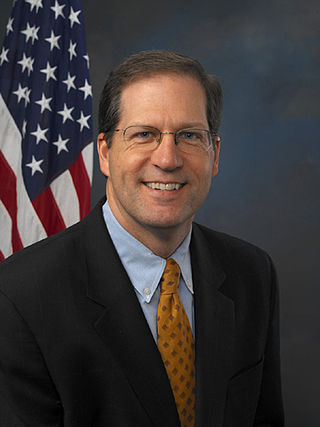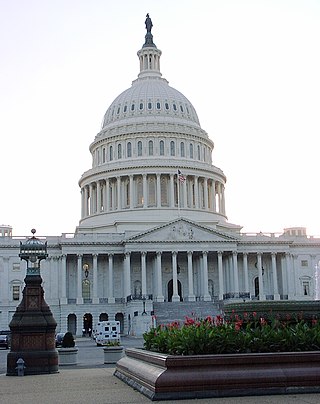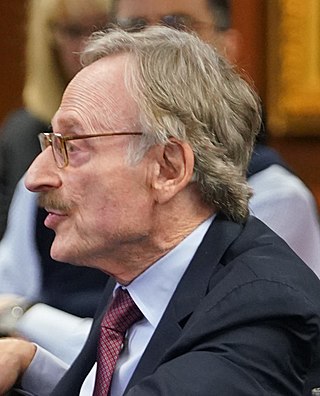Related Research Articles

John Edward Sununu is an American politician who served as a member of the U.S. House of Representatives from 1997 to 2003 and the U.S. Senate representing New Hampshire from 2003 to 2009. Sununu was the youngest member of the Senate for his entire six-year term. He also remains the only Salvadoran American ever elected to the U.S. Congress.

The 108th United States Congress was a meeting of the legislative branch of the United States federal government, composed of the United States Senate and the United States House of Representatives from January 3, 2003, to January 3, 2005, during the third and fourth years of George W. Bush's presidency.

Clifford Bundy Stearns Sr. is an American businessman and politician who was the U.S. representative for Florida's 6th congressional district from 1989 to 2013. He is a member of the Republican Party.

The 106th United States Congress was a meeting of the legislative branch of the United States federal government, composed of the United States Senate and the United States House of Representatives. It met in Washington, D.C., from January 3, 1999, to January 3, 2001, during the last two years of Bill Clinton's presidency. The apportionment of seats in the House of Representatives was based on the 1990 United States census. Both chambers maintained a Republican majority.

The 105th United States Congress was a meeting of the legislative branch of the United States federal government, composed of the United States Senate and the United States House of Representatives. It met in Washington, DC from January 3, 1997, to January 3, 1999, during the fifth and sixth years of Bill Clinton's presidency. Apportionment of seats in the House of Representatives was based on the 1990 United States census.

The United States Senate Committee on Homeland Security and Governmental Affairs is the chief oversight committee of the United States Senate. It has jurisdiction over matters related to the Department of Homeland Security and other homeland security concerns, as well as the functioning of the government itself, including the National Archives, budget and accounting measures other than appropriations, the Census, the federal civil service, the affairs of the District of Columbia and the United States Postal Service. It was called the United States Senate Committee on Governmental Affairs before homeland security was added to its responsibilities in 2004. It serves as the Senate's chief investigative and oversight committee. Its chair is the only Senate committee chair who can issue subpoenas without a committee vote.

The 109th United States Congress was a meeting of the legislative branch of the United States federal government, composed of the United States Senate and the United States House of Representatives, from January 3, 2005, to January 3, 2007, during the fifth and sixth years of George W. Bush's presidency. House members were elected in the 2004 elections on November 2, 2004. Senators were elected in three classes in the 2000 elections on November 7, 2000, 2002 elections on November 5, 2002, or 2004 elections on November 2, 2004. The apportionment of seats in the House of Representatives was based on the 2000 United States census.

Michael Jay Boskin is the T. M. Friedman Professor of Economics and senior fellow at Stanford University's Hoover Institution. He also is chief executive officer and president of Boskin & Co., an economic consulting company.

John Emerson Moss was an American politician of the Democratic Party, noted for his championing of the federal Freedom of Information Act (FOIA) through multiple sessions of the United States House of Representatives where he served from 1953 to 1978.
United States House Judiciary Subcommittee on the Administrative State, Regulatory Reform, and Antitrust is a subcommittee within the House Committee on the Judiciary. The Subcommittee's equivalent in the Senate is the Senate Judiciary Subcommittee on Competition Policy, Antitrust and Consumer Rights. It was previously known as the Subcommittee on Antitrust, Commercial and Administrative Law.
The Subcommittee on Health Care and Financial Services is a subcommittee of the United States House Committee on Oversight and Accountability. It was revived for the 118th Congress by chairman James Comer after Republicans regained control of the House of Representatives.
The Subcommittee on National Security, the Border and Foreign Affairs is a subcommittee of the United States House Committee on Oversight and Accountability. Jurisdiction includes oversight of national security, homeland security, and foreign policy. It was restructured and expanded during the 112th Congress after a committee reorganization spearheaded by full committee chairman Darrell Issa. During Democratic control from 2019 to 2023, it was known as the Subcommittee on National Security.
The Senate Foreign Relations Subcommittee on International Development, Multilateral Institutions, and International Economic, Energy and Environmental Policy is one of seven subcommittees of the Senate Foreign Relations Committee.
The Senate Commerce Subcommittee on Aviation Safety, Operations, and Innovation is a subcommittee within the Senate Committee on Commerce, Science and Transportation. The Subcommittee was formerly known as the Senate Commerce Subcommittee on Aviation, Space and Security, and the Senate Commerce Subcommittee on Aviation Operations and Safety.
The Senate Commerce Subcommittee on Communications, Media, and Broadband is a subcommittee within the Senate Committee on Commerce, Science and Transportation. It was renamed from the Senate Commerce Subcommittee on Communications, Technology, Innovation, and the Internet at the start of the 117th Congress. Prior to the 111th Congress, it was known as the Senate Commerce Subcommittee on Science, Technology, and Innovation.
The Subcommittee on Emerging Threats and Spending Oversight is one of the three subcommittees within the Senate Committee on Homeland Security and Governmental Affairs. It was known in previous Congresses as the Subcommittee on Federal Spending Oversight and Emergency Management.

The Dodd–Frank Wall Street Reform and Consumer Protection Act, commonly referred to as Dodd–Frank, is a United States federal law that was enacted on July 21, 2010. The law overhauled financial regulation in the aftermath of the Great Recession, and it made changes affecting all federal financial regulatory agencies and almost every part of the nation's financial services industry.
The Subcommittee on Technology, Information Policy, Intergovernmental Relations and Procurement Reform is a subcommittee within the United States House Committee on Oversight and Government Reform.
The United States House Select Subcommittee on the Coronavirus Pandemic, formerly the Select Subcommittee on the Coronavirus Crisis, is a bipartisan United States House of Representatives select subcommittee that Speaker Nancy Pelosi has announced will be created to provide congressional oversight of the Trump administration's response to the COVID-19 pandemic in the United States. The Select Subcommittee was established under H.Res.935 during the 116th Congress. Pelosi announced on April 2, 2020, that the committee will oversee the $2.2 trillion economic stimulus/rescue legislation enacted by Congress. The Act created a $500 billion bailout fund for U.S. industry and is the largest economic emergency legislation in U.S. history. It will be a special investigatory subcommittee under the House Oversight Committee.